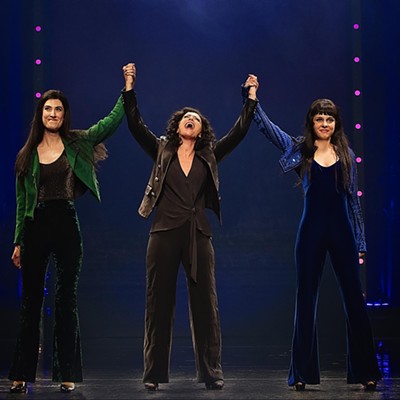A couple of years ago, I decided I needed a hobby that didn’t revolve around fantasizing about brunch. Having spent some of my early life dabbling in the performing arts, preferring improv over all else, I thought I might give it a deeper dive than I did before. After all, what little girl doesn’t grow up dreaming about the day she pretends to be a sad cantaloupe in front of total strangers?
Since then, I’ve graduated from the long form improv conservancy program at Station Theater and completed most of their sketch program. I am also on track to graduate from the short form improv program at ComedySportz Houston next year.
One conversation my fellow performers and I often have revolves around our interactions with people outside our niche. When discussing our hobby with friends, family, and strangers, we end up spending most of that time dispelling the myths about improv.
These misconceptions others hold are far more endearing than they are annoying. It’s nothing to fall into apoplexy over. Not knowing the fundamentals of improv won’t speed up the entropy of all matter and plunge the universe into a state of nonexistence. But for fans (and potential performers), it’s still useful to know what you’re getting yourself into before buying tickets or signing up for classes.
It’s not scripted, and it’s not stand-up.
Every improviser at every level has been told the following at least once in their career:
“Oh, you do comedy? Tell us a joke!”
“Show us some of your act!”
“Hey I have a funny story! You should put it in one of your shows!”
Invariably, we disappoint. We have neither rehearsed routines to share with you nor scripts to include the tales you tell us. Some of us don’t even do comedic improv, but more on that later.
Improv’s ephemeral structure makes it one of the purest examples of “you had to be there” in the performing arts. We literally make everything up show by show; the tradition of asking for audience suggestions is
a simple way of proving that we’re coming up with everything on the fly. If we crack jokes, and we don't always, they grow organically from the context created on stage.
While it’s true that we pull from our own knowledge bases and experiences to create scenes, even the savviest improvisors among us would struggle to shoehorn in everything you tell us to “write” into our show in a way that doesn’t derail the flow. We don’t say no to your well-meaning attempts to be a part of our work because we don’t appreciate you. It’s just if we started planning what to talk about ahead of our shows, then we wouldn’t be doing improv anymore!
It isn’t all about Whose Line is it Anyway?
Whose Line is it Anyway? is a delightful program featuring some incredible talent, but it isn’t the be-all, end-all of improv. It’s only one tiny, tiny seed pod in a giant performing arts rainforest. Two phylums on the improv taxonomy chart encompass short form games (like Whose Line?) and long form, which involves skit-length scenes. And things just get more and more tangled as we break those categories down into different games and forms.
Given that Whose Line? often introduces most general audiences to improv, it’s an understandable misconception that all of it is short form. If you’re interested in attending a live performance or taking a class in line with the fast-paced shenanigans of Aisha Tyler and Her Amazing Friends, then look for short form. If you’re more into sketches or storytelling, then long form will be to your tastes.
Anyone can do it, but that doesn’t mean it’s easy.
Directors consider it poor form to ask them if you can do a show if you’ve received no training. As with all skills, the top tier talent makes things appear far simpler than the reality. There are regular coached practices, jam sessions, classes, and workshops behind every moment in front of an audience. Nobody steps on stage without some level of experience.
It probably seems strange that the free flow nature of improv requires a few rules. “Yes, and” is the most famous; it asks that you graciously receive the details and situations your scene partners give you and
build from there. On top of that, you also have to balance character consistency, object work, situational stakes, setting, relationships, the rules of your chosen structure, and everything else that goes into telling a great story… and you have to do it entirely on the spot. You execute literal mental gymnastics up there.
Improv does have a low barrier to entry, however. If you possess an imagination, a willingness to be vulnerable, and a desire to step outside your comfort zone, then congratulations! You’re qualified to start improv classes. If you’re not interested in giving it a shot yourself, now you know a little bit about what all goes on behind the scenes to bring you the best possible show.
As mentioned earlier, improv doesn’t always have to involve jokes. It’s probably the most popular and the most common type of performance thanks to Whose Line?, but we do the art a disservice to portray it as a volley of nonstop laughs. Improv stretches out to embrace as many genres as every other type of media. I’ve seen improvised sci-fi episodes, surrealism, drama, storytelling, and musicals. Some attorneys even hire improvisers for psychodramas to prepare for cases.
One of the most evocative and memorable improv scenes I’ve ever watched wasn’t even funny. Far from it. The two performers never spoke, and they crafted a heartbreaking narrative about a woman finding out her husband died in a war. It stands out in my mind because of the care they took in their body language and ability to communicate their emotions in a way that never came off as forced. Such a beautiful moment could not have occurred if improvisers never flew out of the comedy pigeon hole.
Good improv stems from setting up strong relationships and building a recognizable reality. If you have those elements, you have a great show.
Audience involvement doesn’t always invite audience participation.
I have few audience pet peeves, but anything disrespecting the performers certainly ranks pretty high up there. When it comes to being mistaken for stand-up as mentioned earlier, the only major downside is that members of the crowd sometime decide they can behave like they’re attending a stand-up show. Most of the time it just means they carry on conversations in hushed voices throughout, but every so often we land ourselves a veritable Lucy Ricardo.
I once participated in a set where one team member yelled across the stage to another. Some smarmy guy in the front row pretended he was the one being addressed and started to respond, looking over his shoulder to
see if anyone was watching him. Nobody at all found this disruption impressive, least of all us. We weren’t impressed by his skills and scrambling to bring him into the fold afterward. We were annoyed at his entitlement and complete lack of regard for us as performers, as well as the rest of the audience.
Unless you’re explicitly asked to take part in a scene or a suggestion session, don’t. Some improvisers who incorporate scripted elements into their shows may seed the audience with their peers, but again, they plan things like this ahead of time and are not issuing an invitation for you to take part.
Instead, the rules fall more in line with attending a play. Treat it like the theater production it is; if you wouldn’t do it during an Alley production, then don’t do it at an improv show. The performers and your fellow audience members appreciate it immensely.
Whether you want to enjoy improv as a fan, a hobbyist, or an aspiring professional, an understanding of the basics enhances the experience. If nothing else, at least you know now why none of your friends who play make ‘em ups take you up on offers to use your material.







